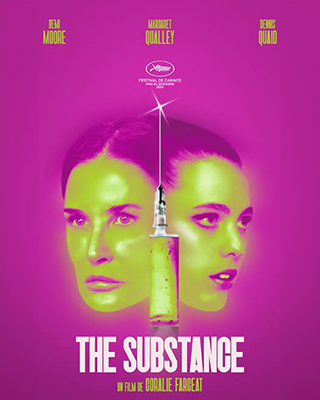It’s been a while since I’ve enjoyed a body horror movie that didn’t have the Cronenberg name attached. That’s all changed with “The Substance,” a highly-stylized and frenetically-paced film from writer/director Coralie Fargeat that could easily make its mark as a midnight movie cult classic.
On her birthday, Elisabeth Sparkle (Demi Moore) learns her shine as a TV workout queen is in decline. When Harvey, her flamboyantly-dressed boss (manically played by Dennis Quaid), breaks the news that the limit to her luster is age 50, Elisabeth has a chance encounter with a doctor who claims she is a prime candidate for a drug simply called ‘the substance’. Wallowing in the pity of being past her prime, Elisabeth opts for the carrot the ‘substance’ drug dangles in front of her- she can split her DNA and create a younger version of herself.
Of course, there’s a caveat to the creation- both women must alternate weeks of existence as, even though they are separate bodies, they are one entity: while one lies dormant, the other gets to enjoy being alive. We don’t know what that means until Elisabeth takes the substance and spawns Sue (Margaret Qualley). Sue enjoys being young and sexy, even answering an ad to be the next Elisabeth Sparkle. Ironically, that happens: Harvey hires her to replace Elisabeth as the new workout queen.
Of course, as the ‘70’s Chiffon margarine commercial taught us, it’s not nice to fool with Mother Nature. Sue soon wants more time and doesn’t stick to the alternating week agreement. For more time, Sue must suck more energy from the comatose Elisabeth. The result of reaping more energy from Elisabeth has a detrimental effect and brings the ‘we are one’ forewarning to bear: Elisabeth ages rapidly. Can Elisabeth withstand withering body parts before Sue selfishly saps her life force?
While “Substance” has fun playing with movie themes we’ve seen before, from Frankenheimer’s “Seconds” (where the elderly pay for younger bodies) to “All About Eve” (where the ingénue usurps her mentor’s power) to “Frankenstein’s” unholy creation of another life, what I saw most in “Substance” was a clever send-up of “The Picture of Dorian Gray.” With “The Substance’s” production design of bigger-than-life portraits of the protagonists and their over-the-top obsession and yearning for youth, narcissism was never as deftly displayed.
Though not for the squeamish, those looking for Demi Moore to sink her teeth into one of her best roles can overlook the splatter. Fargeat may have won best screenplay at this year’s Cannes Film Festival, but it’s her visuals and Moore’s virtuoso performance that make “The Substance” substantial.

